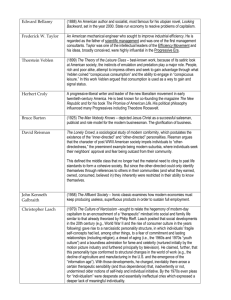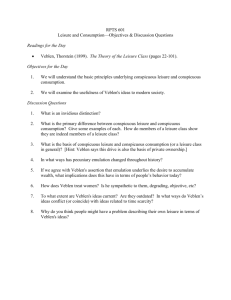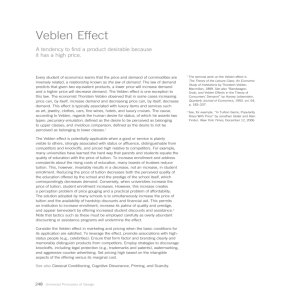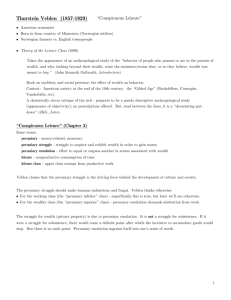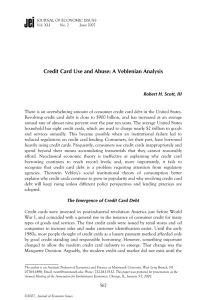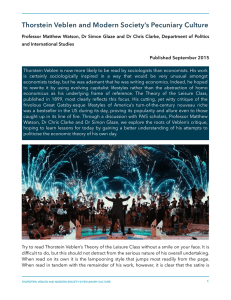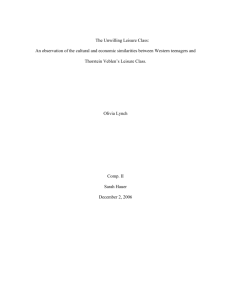Thornstein Veblen
advertisement
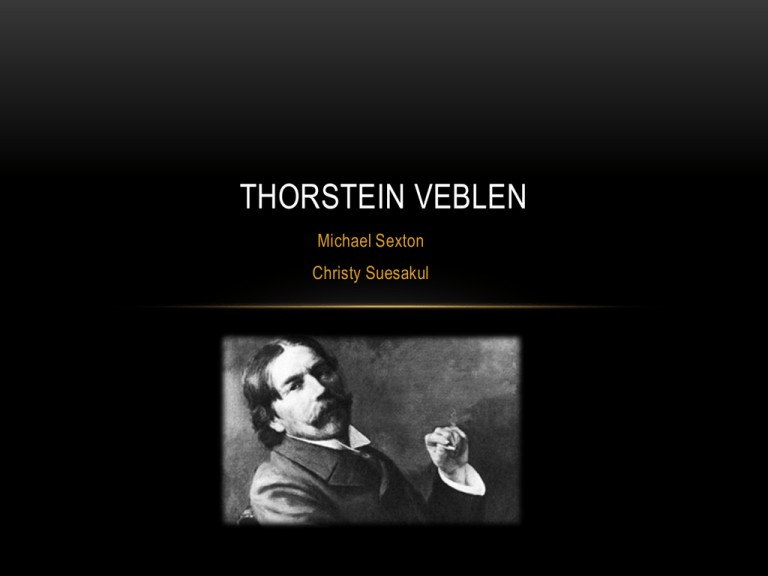
THORSTEIN VEBLEN Michael Sexton Christy Suesakul BACKGROUND • Thorstein Bunde Veblen was born July 30, 1857 on a Wisconsin Farm. He was the sixth of twelve children born to Norwegian immigrants. • When he was seventeen he entered the academy of Carleton, a Christian evangelical school which was very strict towards free-thinking and –acting behavior. Veblen was not well suited for this college but still graduated in 1880. • He received a Ph.D from a Ivy League school and strong letters of recommendation from that school but still was subject to discrimination because of his agnostic views and Norwegian background (immigrant status). • He decided to continue his studies at Cornell as a graduate student in social sciences in 1891. Here he published a paper, “Some Neglected Points in the Theory of Socialism” along with a number of technical papers for The Quarterly Journal of Economics. • This lead to him becoming an instructor at the University of Chicago. BACKGROUND • Veblen's teaching methods at the University of Chicago were different and he was known deliberately discourage students from taking his class. He would mumble through his lectures but his students would always admire his wit. • He also very susceptical to women who were very attracted to him and there were many rumors about his affairs. When he realized the college frowned at this behavior he said “what am I to do, if I am pursued, and I am not the pursuer”. • He became the editor of the Journal of Political Economy. In 1898 he published his first critique of economic theory, “Why is Economics Not and Evolutionary Science?” • He then published two books, the first and most widely read , The Theory of Leisure Class. The other The Theory of Business Enterprise which was not as well received as Leisure. BACKGROUND • His womanizing finally caught up to him and caused both his job at the University of Chicago and his wife finally leaving him. • A former student and good friend to Veblen helped him out and was able to get him a position at University of Missouri. Here he remarried and was able to publish 8 more books throughout his years there. • In 1926 he returned to Palo Alto, California and lived in a shack town. On August 3, 1929 Thorstein Veblen died, “just before the Depression which many felt his work anticipated. INFLUENCES • Karl Marx • Did not consider himself a Marxist and actually disagreed with him on multiple statements. He still was very influential on him and his works. • Herbert Spencer and Charles Darwin • He strongly believed in Spencer's survival of the fittest principle and applied it to his analysis of industry. Veblen also spoke of economics as pre-Darwinian and postDarwinian science. • Immanuel Kant • Veblen’s treatise The Nature of Peace and the Terms of its Perpetuation was consciously modeled after Kant’s Perpetual Peace. INFLUENCES • Pragmatism and Psychology • American Pragmatism was the prevailing intellectual thought during Veblen’s primary academic years. Veblen also valued Psychology because it provided an alternative view of economics • Edward Bellamy • Enjoyed Bellamy’s novel Looking Backward. Veblen was pleased with this brand of utopian thought because it did not advocate the reactionary behavior of going back to agrarian society. THE THEORY OF THE LEISURE CLASS • Definition of Leisure Class • • Those persons who engaged in non-productive economic behaviors; similar to the business class The members of the leisure class participated in the following • Conspicuous Consumption • Purchasing of items not necessary for basic survival • Conspicuous Leisure • Non-productive use of time EVOLUTIONARY THEORY • “It is a theory of a process, of an unfolding sequence.”-Veblen • Influenced here by Spencer and Darwinist ideas • “Fittest” survive while the “unfit” risk dissolution • Therefore, societies need to change with the times in order to survive • Change in society is directly related to the state of “Industrial arts,” or the level of technology available to a society • Effects of technology on society is not always immediate EVOLUTIONARY THEORY • Social change can polarize a society • Those that are involved with the new technologies VS. Those that are invested in old ways • Periods of transition between old and new emerging social order, social conflicts are likely to surface • Ready-Made Technologies (Cultural Borrowing) • Cultures borrow the technological arts from other societies, and skip the trial and tribulations of developing such technologies. EVOLUTIONARY THEORY CULTURAL LAG AND CULTURAL BORROWING • • Cultural Lag-William Fielding Ogburn • Lag that occurs when one part of culture changes, before or in greater degree than, other correlated parts do; thereby causing a gap between the parts that had never existed previously. • Most often applied to the adaptation of new technologies to existing social institutions • Captains of industry that introduce the new technologies can also be guilty of a cultural lag, if they purposely limit production in order to maximize production Cultural Borrowing • The borrowing of technology, after the original creators of the technology have learned to fully maximize its usage • Involves all the benefits of the technology but not the original costs • Limitations • Borrowing society may not be suited for the utilization of the new technologies • New technology may be so large that it consumes the borrowing society HUMAN NATURE: CLASS, GENDER, AND RACE • Humans engage in “tropismatic action”—behaviors that involves no conscious thought process • Habitual and ultimately institutionalized behaviors • Technological advancements and social change shape and alter culture • Class, gender, and race are subject to changes • This is encouraging for those that face economic disadvantages, oppression, racism and sexism HUMAN NATURE: CLASS, GENDER, AND RACE CLASS • Humans possess an instinct of workmanship-a need to work, create to do something • The need for status would serve to stimulate the desire to create a surplus • Accumulation of items is a goal, in order to bring status to oneself • Wealthy-Class • Involved themselves in conspicuous consumption and conspicuous leisure • Lower-Class • Involved in manual labor • Wealthy-class began to see manual labor as work that was beneath them HUMAN NATURE: CLASS, GENDER, AND RACE GENDER • Beginning of human history men and women were equal, but as time passed poor women began to feel the burden of hard tasks more often • Pregnancy and nursing demobilized women, while the tribe could survive while the males were gone for long periods of time • War, hunting, government, religion and sports were treated with a mark of respect-men’s jobs • Routine work was seen as unworthy to men • Men would show off their possessions like trophies-including their women HUMAN NATURE: CLASS, GENDER, AND RACE RACE • Veblen argued that there are individual and racial difference in instincts • Europeans had an advantage over “lower cultures” • Europeans are better able to equipped to adapt to changing environments • Lower cultures have racial homogeneity, therefore are not able to adapt as well in changing environments HIGHER EDUCATION • Science and Scholarship are the purpose of education • Veblen believed that business was becoming the goal of education • Recognized the value of educated students, but did not believe it was the job of Universities to educate the masses • Secondary, professional, and trade schools • Upset with sports, fraternities, clubs and extracurricular activities at Universities • These led to career choices in business WHAT DO SOCIOLOGIST GAIN? • The Theory of the Leisure Class • Veblen’s most famous and lasting contribution • Helped Sociologist to understand why people spend their money and time in nonproductive ways • Evolutionary Theory • Helped Sociologist to understand one contributing factor of weather a society survives or not-technology LIMITATIONS • The Theory of Leisure Class • Saw Sports negatively • Leisure choices can tell you more about a person than their career • Sports can help with the following • Builds friendships • Gives participants and spectators a sense of belonging • Reminder of some stability in an ever changing world • Thought that by granting someone status as a result of exploitation and non productive behavior compromised the value of routine labor
